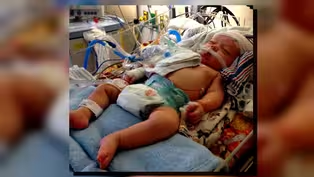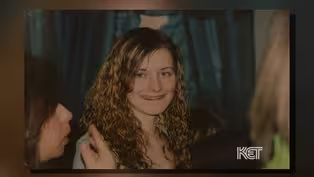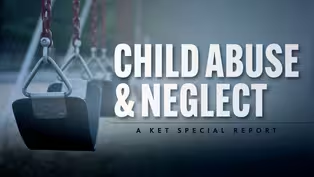Liz Renner
Clip | 14m 50sVideo has Closed Captions
Liz Renner describes how her son, Colton, survived the deadliest type of physical child.
Liz Renner describes how her son, Colton, survived the deadliest type of physical child, shaken baby syndrome, and the challenges ahead due to that life-altering abuse.
Problems playing video? | Closed Captioning Feedback
Problems playing video? | Closed Captioning Feedback
Liz Renner
Clip | 14m 50sVideo has Closed Captions
Liz Renner describes how her son, Colton, survived the deadliest type of physical child, shaken baby syndrome, and the challenges ahead due to that life-altering abuse.
Problems playing video? | Closed Captioning Feedback
How to Watch
is available to stream on pbs.org and the free PBS App, available on iPhone, Apple TV, Android TV, Android smartphones, Amazon Fire TV, Amazon Fire Tablet, Roku, Samsung Smart TV, and Vizio.
He was such a ball of joy.
He was a really good baby son.
You could tell he had a really good personality.
And then for me, it was a big adjustment.
Just learning motherhood.
What his mom what was it like to be a mom?
And, you know, getting those hugs and kisses and the oohs and goos is just a really fulfilling feeling.
I had been noticing changes in Colton's development over a period of time after I went back to work.
It wasn't initially when I went back to work, but over a few weeks after that and there were developmental changes.
They were things like his hands being bested.
His head size appeared larger to me.
Very minor developmental.
Take the tummy time.
Oh gosh, that was terrible.
And there were minor developmental changes that I, you know, shared with my friends, his doctor.
Everybody thought I was being a little bit dramatic.
And I chalked it up to me being an over maybe a helicopter mom and overprotective mom, first time mom.
So on November 12th was the Thursday I got home that evening.
I got home later from a doctor's appointment and met Jeff and my mom at home.
My mom wanted to come out and visit with us, and Colton seemed very uncomfortable.
I thought it was sickness because he was warm to touch.
He was sleepy.
He was fussy.
When you did bring me, you know, try to wake him up.
He wasn't out of it, but he was just.
He just wanted to sleep.
So I chalked it up to being his first illness.
We had only had one round of shots, so I thought we were just experiencing our first sickness.
I called a friend who's a nurse, and she gave me just, you know, the standard things, you know, warm baths.
Here's your Tylenol dosage.
And of course, it gets worse because the emergency room.
I also called his after hours nurse line.
They said the same thing, and that's what I did.
I gave him a warm bath.
I treated with Tylenol, even set my alarm every 3 hours through that evening to feed him because I thought, well, we're sick and we need hydration.
And he wasn't better Friday morning when we got up.
So I made a doctor's appointment for his pediatrician.
And that morning we went to see her and she couldn't find anything.
She no, she knew he didn't feel well.
He could tell.
He didn't feel well.
He didn't have a fever at that moment.
But she said, well, since he's just so young, let's let's go do blood work.
And when we went down to do blood work, he was in a car carrier and had the had to have the cutest little car seat cover to go with it.
And we I pulled back the car seat cover and he was doing this twitching motion with his arm.
And the lady that was taking his blood looked at me and said, Is that normal?
I don't know.
Is that normal?
And of course, she said, I'm not a medical professional.
She's I just advise you to go back upstairs.
And that's what we did.
We went back up to his pediatrician.
And at that point, I had called my husband, Jeff, to come meet me and we went back up to the pediatrician.
And when we got back in, she said, well, because of this episode, And she said, I now see that his soft spot is bulging.
I'm just going to be conservative.
Let's send you to the children's hospital.
So at this point, it's 2:00 on November 13th, and we loaded up, we grabbed my mom and we went to the children's hospital.
And that's kind of where the downward slide starts.
We got back rather quickly.
They started the whole battery of medical assessments, blood work, urinalysis, and just all your standard protocol.
All of that's coming back normal.
And but he's actively still having these episodes, which it's been pretty determined at this point.
These are seizures.
They decide to do a lumbar puncture to try and take some cerebral spinal fluid.
And when they did that, his cerebral spinal fluid was was bloody.
And it's too much information, but it was bloody.
And that indicated that there was internal bleeding on his brain somewhere.
And then they took they sent us for a CT scan and the CT scan revealed a lot of hemorrhaging on his brain.
And at that point, we were sent to ICU to kind of determine where we're going from here.
I remember it being a fog that Friday night.
I don't I just remember going from this room to that room to this test for that test.
And they were telling me, you know, he had blood on the brain and we're going to send you to ICU.
But I don't know that at all.
Was sinking in.
And we got up to ICU late that evening and the ICU doctor looked at Jeff and I and said, Who heard your child?
And we were That was the first time somebody had told us that that's what they were suspecting was wrong.
And Jeff and I were flabbergasted.
We looked at each other and suddenly, I mean, who heard our child?
And we kind of laughed just because we were shocked at what they were telling us.
And so he's sick.
He has a fever.
He said, I have my suspicions, but I strongly believe somebody hurt your child.
So from Friday night on, we were you know, they started, you know, put him on.
They did an EEG.
They put him in a medically induced coma because they were trying to slow the seizures, because at this point, his seizures were just back to back to back.
And he was uncomfortable.
Their idea of putting him in a coma was to lead us to an MRI, eventually to kind of paint a better picture of what has actually happened.
In the meantime, Saturday afternoon, a state police officer showed up at our hospital room and interviewed Jeff and I both, you know, asked questions.
He showed up with a with a regional social worker as well.
They asked us the questions, you know, what about this?
What about that?
You know, has he been have you been in a car accident lately?
Have you?
You know, leading to the point there was significant trauma.
We didn't have the answers that they wanted.
And and they said, well, I think we're going to pass this off to our detective.
We think this might need a little more attention.
So sometime Sunday, maybe into Monday, a another social worker and a detective with the State Police Department showed up in our room and along with a forensic pediatrician, which I did not know existed.
I am certainly glad that there's a field for that because it's in our it's in our society.
But and in the interview to us, they interviewed Jeff and I again, they interviewed my my parents.
They interviewed his parents sister, because for just the ones that were with him the most often and we didn't have any other, which is the same, they asked questions about Jeff as a parent.
They ask questions about me because they interviewed us separately.
And at the end of that day, the social worker made the call just out of precaution that we were no longer allowed to be alone with Colton, which really stinks.
And we certainly respected the process because they we knew that.
We knew that there had to be a plan moving into the next week.
Colton went for an MRI again to paint the picture of what happened and when the MRI result MRI results came in, they sat us down for a meeting and you're talking a meeting with two or three ICU doctors there, their nurse practitioners, the nurses, the social worker, the forensic pediatrician.
And they said this isn't the first time your child had been abused.
And we just where did we feel, you know, what?
Where did we go wrong?
How did we miss this Mark so badly?
They just said it was all blood new blood on top of old blood.
He also had retinal hemorrhaging in his eyes and none of his injuries were mere physical injuries.
Like you couldn't they were not present to the naked eye.
Also, out of caution, because our child was also a part of a you know what, with a child care provider, they interview the child care provider.
And any family that had to use that child care provider.
And they're our friends.
Our friends were encouraged to come to the hospital that night also and get evaluated.
And when they evaluated their child, their child had two breaks in her leg.
One dating, I think at the time, three weeks old and one was was five weeks old.
And that that sort of gave the picture of this injury didn't happen by these people It happened in the childcare providers care you know from there.
Our intention our our attention turned to Colton like we couldn't worry about all of that.
So he spent the next week trying to navigate just the medical life.
We were told Colton would be mechanically dependent.
He would be on a tray, a feeding tube, and that that's if he even made it.
They asked us about dinner hours for a four month old.
I just can't even wrap my brain around that.
They prepared us.
They prepare us for the worst.
Colton then started breathing on his own, which was they told us not to get too excited about that.
After about a week and a half, two weeks, they were able to remove his breathing tube and the ICU doctor said, If you told me three days ago we would be able to remove this tube, I would have told you you were crazy.
And he started breathing on his own.
The next step was to get him to eat on his own.
So over the course of another weekend, we worked with him on a passing dipping, his passing sugar water and he started to take his passing.
And that was a good indication that he would begin to suck a bottle.
And he did.
He he set a bottle and we were able to remove his feeding tube.
And so we were able to come home after three weeks of being in the hospital.
But our life didn't stop there.
We started a whole life of medical world after that, You know, he had countless seizures still.
They were in therapy that day, and it was definitely a life to navigate.
Probably the day we left the hospital.
I guess it was a wakeup call that I'm not going to have a nurse here to help me.
I have to do this on my own.
So I'd say that would be the day that it was like, Oh, this is real.
This is real life.
And it was those first three months coming home after that were scary because we felt every move we would make wasn't going to be the right one.
And I think still to this day, we questioned some of the decisions we we have put in front of us both really scared that this was going to wear us down.
As parents.
I am worried about my relationship that this would wear us down as parents.
My relationship with Jeff, how is this going to strain that?
How is this going to you know, is he going to be able to have the relationships with friends?
Is he going to be able to go ever stay the night with his grandparents?
The things that we got as children?
I so wondered.
I didn't even set myself up for an expectation because I didn't want to be disappointed and I'm pleased.
That's not that's not our life.
He gets to live a pretty fulfilling life.
He gets to have his buddies and he gets to have his grandparents and he loves to play the piano.
He loves Mickey Mouse clubhouse and he loves super simple songs on YouTube.
Colton is not the child they predicted he would be.
He is a super vivacious seven year old, and I like to say he's a force to be reckoned with.
He's he's a wild man.
He's a wild man.
The school wrote on his note just the other day.
He was hyper today and they meant it in a very positive way.
He was in a good mood.
He was loving.
He was having a good time.
So he's definitely a Chatty Cathy.
The biggest thing I would want families to take away is advocate for your child.
If you feel in your gut that something isn't right, it's okay to have open, honest conversations.
I feel like if I maybe had addressed and had more of an open, honest conversation instead of trying to be nice or play nice, maybe we could have done some prevention.
But having been even preventing from the beginning, when you when you're enrolling a child into a child care facility or even a family member, even if it is a family member having that conversation, hey, this is a thing if you're feeling upset, if you're feeling overwhelmed, it's okay to sit my child down in a safe space and go get a drink of water and, you know, Go, go, go.
Step outside for just a more and grab.
You're just a breath of fresh air.
As long as my child is safe, it is okay that you have to take care of yourself.
Because if we're not caring for ourselves, our kids aren't going to be cared for.
Because I want to make sure that Colton's story does do the impact of I don't want somebody to go through the nightmare that we have lived through.
Video has Closed Captions
Clip | 6m 59s | Mandy Colwell shares her story of overcoming addiction and regaining her three children. (6m 59s)
Video has Closed Captions
Clip | 14m 50s | Liz Renner describes how her son, Colton, survived the deadliest type of physical child. (14m 50s)
Video has Closed Captions
Clip | 35m 14s | Laken Albrink recounts her heartbreaking experience of sexual abuse from a close relative. (35m 14s)
Child Abuse and Neglect: A KET Special Report - Preview
Video has Closed Captions
Preview | 40s | Preview of Child Abuse and Neglect: A KET Special Report. (40s)
Providing Support for PBS.org
Learn Moreabout PBS online sponsorship
- News and Public Affairs

Top journalists deliver compelling original analysis of the hour's headlines.

- News and Public Affairs

FRONTLINE is investigative journalism that questions, explains and changes our world.












Support for PBS provided by:



